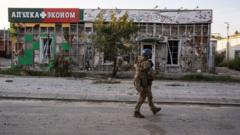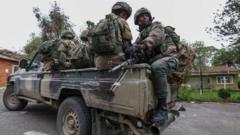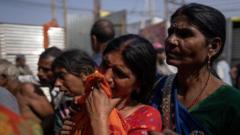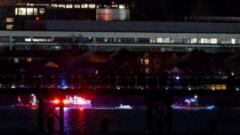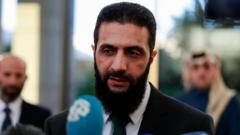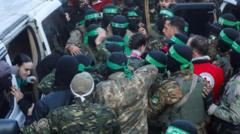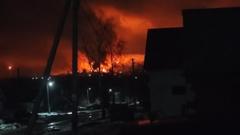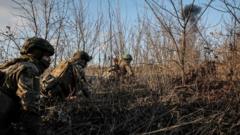Ukrainian special forces report that North Korean troops may have withdrawn from the front lines in the Kursk region due to heavy losses, while Western officials indicate that approximately 1,000 North Koreans have died in recent conflicts.
Ukraine Claims North Korean Troops Have Withdrawn from Front Lines

Ukraine Claims North Korean Troops Have Withdrawn from Front Lines
Reports suggest significant casualties among North Korean forces fighting for Russia, with implications for ongoing military strategies.
Article Text:
Ukrainian special forces operating in Russia's western Kursk region have alerted the media that they have not witnessed the presence of North Korean troops for the last three weeks. A spokesperson for these forces indicated that it is probable these soldiers have retreated after incurring substantial casualties. Recent statements from Western officials suggested that around 1,000 out of approximately 11,000 North Koreans dispatched to support Russia have been killed over a span of just three months.
Both North Korea and Russia have chosen not to comment on these developments. The Ukrainian spokesperson specified that his remarks pertain solely to the areas in Kursk where his forces are actively engaged in combat. Although the entirety of the situation remains unclear, these observations point to significant losses suffered by North Korean soldiers.
Further corroboration from the New York Times noted that North Korean forces may have been removed from the battlefield, with U.S. officials indicating that this withdrawal could be temporary. It is suggested that these troops might return after undergoing further training or after the Russians devise new deployment strategies to mitigate casualties.
According to intelligence from South Korea, the North Korean soldiers are reportedly ill-equipped for the demands of modern warfare, making them particularly susceptible to attacks from Ukrainian drones.
Amid the backdrop of weakened military performance on the part of North Korean forces, the relationship between Russian President Vladimir Putin and North Korean leader Kim Jong Un has strengthened in recent months, culminating in the signing of a defense treaty. North Korea's support for Russia includes the provision of substantial amounts of ammunition and weaponry.
In August, elite Ukrainian troops conducted a surprise offensive in Kursk, managing to capture over 1,000 square kilometers (approximately 386 square miles) of territory. Since this bold maneuver, Russian forces have made strides in reclaiming some of that area, as Moscow continues its determined – albeit slow – advance in eastern Ukraine, capturing several settlements within the Donetsk region.
Currently, Kyiv is focused on maintaining control over the territories it has acquired in Kursk, viewing this as a strategic advantage for any future ceasefire or peace negotiations with Russia. The full-scale invasion of Ukraine by Russian forces commenced in February 2022, altering the regional landscape significantly.
Ukrainian special forces operating in Russia's western Kursk region have alerted the media that they have not witnessed the presence of North Korean troops for the last three weeks. A spokesperson for these forces indicated that it is probable these soldiers have retreated after incurring substantial casualties. Recent statements from Western officials suggested that around 1,000 out of approximately 11,000 North Koreans dispatched to support Russia have been killed over a span of just three months.
Both North Korea and Russia have chosen not to comment on these developments. The Ukrainian spokesperson specified that his remarks pertain solely to the areas in Kursk where his forces are actively engaged in combat. Although the entirety of the situation remains unclear, these observations point to significant losses suffered by North Korean soldiers.
Further corroboration from the New York Times noted that North Korean forces may have been removed from the battlefield, with U.S. officials indicating that this withdrawal could be temporary. It is suggested that these troops might return after undergoing further training or after the Russians devise new deployment strategies to mitigate casualties.
According to intelligence from South Korea, the North Korean soldiers are reportedly ill-equipped for the demands of modern warfare, making them particularly susceptible to attacks from Ukrainian drones.
Amid the backdrop of weakened military performance on the part of North Korean forces, the relationship between Russian President Vladimir Putin and North Korean leader Kim Jong Un has strengthened in recent months, culminating in the signing of a defense treaty. North Korea's support for Russia includes the provision of substantial amounts of ammunition and weaponry.
In August, elite Ukrainian troops conducted a surprise offensive in Kursk, managing to capture over 1,000 square kilometers (approximately 386 square miles) of territory. Since this bold maneuver, Russian forces have made strides in reclaiming some of that area, as Moscow continues its determined – albeit slow – advance in eastern Ukraine, capturing several settlements within the Donetsk region.
Currently, Kyiv is focused on maintaining control over the territories it has acquired in Kursk, viewing this as a strategic advantage for any future ceasefire or peace negotiations with Russia. The full-scale invasion of Ukraine by Russian forces commenced in February 2022, altering the regional landscape significantly.


